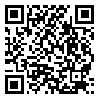Volume 9, Issue 43 (12-2021)
2021, __(43): 167-181 |
Back to browse issues page
Research code: A-10-2463-1
Download citation:
BibTeX | RIS | EndNote | Medlars | ProCite | Reference Manager | RefWorks
Send citation to:



BibTeX | RIS | EndNote | Medlars | ProCite | Reference Manager | RefWorks
Send citation to:
akbarzadeh Z, fallah V, rasoli E. The neglected null dimensions of the curriculum obtained in the field of educational sciences from the point of view of new scholars of Farhangian University (A phenomenal study). Journal title 2021; 9 (43) : 7
URL: http://erj.khu.ac.ir/article-1-811-en.html
URL: http://erj.khu.ac.ir/article-1-811-en.html
azad university
Abstract: (4857 Views)
The purpose of this study was to identify the null aspects of the curriculum acquired at Farhangian University of Educational Sciences. The present research approach is a qualitative approach of phenomenology. The statistical population of the study consisted of neo-teachers in the educational sciences of the university in the academic year of 98-99. Purposive sampling continued until theoretical saturation. The study involved 16 (5 men and 11 women) neo-educators. In-depth semi-structured interviews were used to gather information. Seven stages of Colaizzi method were used for data analysis. The findings of this study were finally presented in 7 main themes (Lack of practical training in the document of fundamental change, lack of Islamic professional identity of the teacher, lack of how to cultivate creativity, lack of content knowledge, lack of pedagogical knowledge, lack of sociological knowledge, lack of knowledge of Islamic psychology, lack of eclectic art) or The same dimensions and 23 components were finally presented in the form of a concept map. Paying attention to this concept map can be a point of reflection for those involved in the curriculum of educational sciences to rethink the curriculum of Farhangian University.
Article number: 7
Type of Study: Research Paper |
Subject:
Educational Programing
Received: 2020/04/26 | Accepted: 2022/04/19 | Published: 2022/05/1
Received: 2020/04/26 | Accepted: 2022/04/19 | Published: 2022/05/1
References
1. Alemu, M., Kind, Vanessa , M., Basheh, Kassa Michael, Mulugeta Atnafu, Per Kind & Taha, Rajab(2019). The knowledge gap between intended and attained curriculum in Ethiopian teacher education: identifying challenges for future development. A Journal of Comparative and International Education Published Online: 08 Apr. [DOI:10.1080/03057925.2019.1593107]
2. Burkhardt, H. (2014). Curriculum Design and Systemic Change. In: Li Y, Lappan G. (eds) Mathematics Curriculum in School Education. Advances in Mathematics Education. Springer, Dordrecht. [DOI:10.1007/978-94-007-7560-2_2]
3. Carracedo, Fermín Sánchez. Soler, Antonia & Carme Martín & David López & Alicia Ageno & Jose Cabré & Jordi Garcia & Joan Aranda & Karina Gibert. (2018). Competency Maps: an Effective odel to Integrate Professional Competencies Across a STEM Curriculum. Journal of Science Education and Technology, 27,448-46 [DOI:10.1007/s10956-018-9735-3]
4. Chapman, G. and Tunmer, J. (2013); The effects of mental comprehension strategies in learning disabled student. Journal of Learning Disabilities, 18: 111-122.
5. Craig Kridel(2010)، Encyclopedia of Curriculum Studies. [DOI:10.4135/9781412958806]
6. Cohen, L. & Manion, L. (1986), Research Methods in Education. London, Routledge.
7. Day, Christopher, & Kington, Alison. (2008). Identity, well‐being and effectiveness: the emotional contexts of teaching. Pedagogy, Culture & Society, 16(1), 7-23. Doi: 10.1080/14681360701877743. [DOI:10.1080/14681360701877743]
8. Darling-Hammond, L., & Rothman, R. (Eds.) (2011). Teacher and leader effectiveness in high-performing education systems. Washington, DC: Alliance for Excellent Education and Stanford, CA: Stanford Center for Opportunity Policy in Education.
9. Eisner،E.W.(1994).The Educational Imagination:Ondesign and evaluation of school programs.(3 rd.ed)New York:Macmillan
10. Espinoza, C., Mardones, C., Sáez, K., & Catalán, P. (2019). Entrepreneurship and regional dynamics: the case of Chile. Entrepreneurship & Regional Development, 31(9-10), 755-767. [DOI:10.1080/08985626.2019.1565421]
11. EISNER, E,.( 1985)W. The Educational Imagination: On the Design and Evaluation of School Programs. New York: Macmillan Publishing Co., second edition
12. Encyclopedia of Curriculum studies (2010). Craig kridel, Copyright by SAGE Publications, Inc.
13. Flinders, David J., Noddings Nel and Thornton, Stephen J. (1986). The Null curriculum: Its Theoretical Basis. Curriculum Inquiry, Vol.16, No. 1(spring, 1986), pp.33-42. [DOI:10.1080/03626784.1986.11075989]
14. Glatthorn, A. A., Boschee, F., & Whitehead, B. M. (2016). Curriculum leadership, fourth Edition, printed in he united states of America.
15. Ginns, P., Kitay, J., & Prosser, M. (2010) Transfer of academic staff learning in a research-intensive University. Teaching in Higher Education, 15 (3), 235-246. [DOI:10.1080/13562511003740783]
16. Gillham, B. (2000), The Research Interview, London, Rautledge.
17. Glatthorn, A. et.al (2005). Curriculum Leadership: Strategies for development and implementation. Los Angeles & London: SAGE Publications, Inc
18. Harriet Able, Jocelyn Glazier, Ritsa Mallous, Ashley Boyd, Kristen Bell-Hughes & Deborah Eaker-Rich.Reconnect (2018)and Recharge: Plugging New Teachers into Support Outlets.Action in Teacher Education, Volume 40, - Issue 2.Published Online: 10 Apr 2018). [DOI:10.1080/01626620.2018.1424048]
19. Pasandide, A. Tavakkoli, M, Kazazi N و The Mediating Role of Gratefulness in the Relationship between Desires and Satisfaction and Its Islamic-Psychological Explanation, Positive Psychology Research, Vol. 6, No. 3, 2020.
20. Tunmer, W. E &. Chapman . J. W .A Longitudinal Investigation of the Influence of Literacy-related Skills, Reading Self-perceptions, and Inattentive Behaviours on the Development of Literacy Learning Difficulties. Volume 60, 2013 - Issue 3 [DOI:10.1080/1034912X.2013.812188]
Send email to the article author
| Rights and permissions | |
 | This work is licensed under a Creative Commons Attribution-NonCommercial 4.0 International License. |





